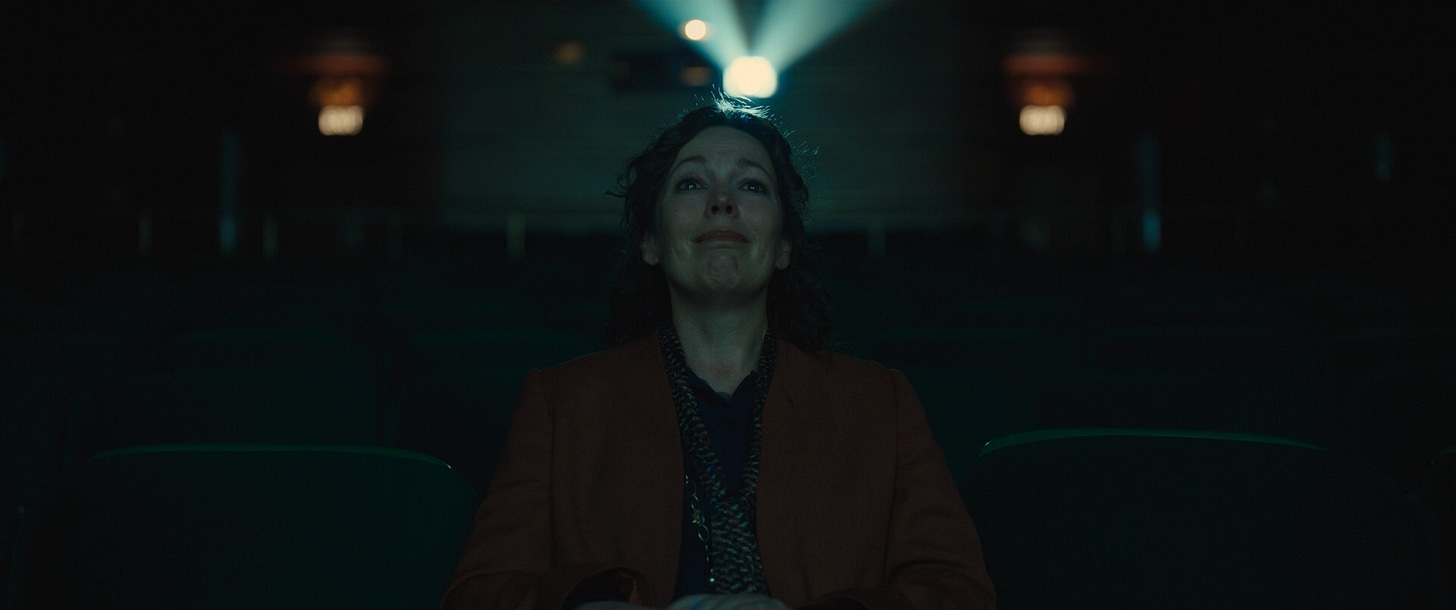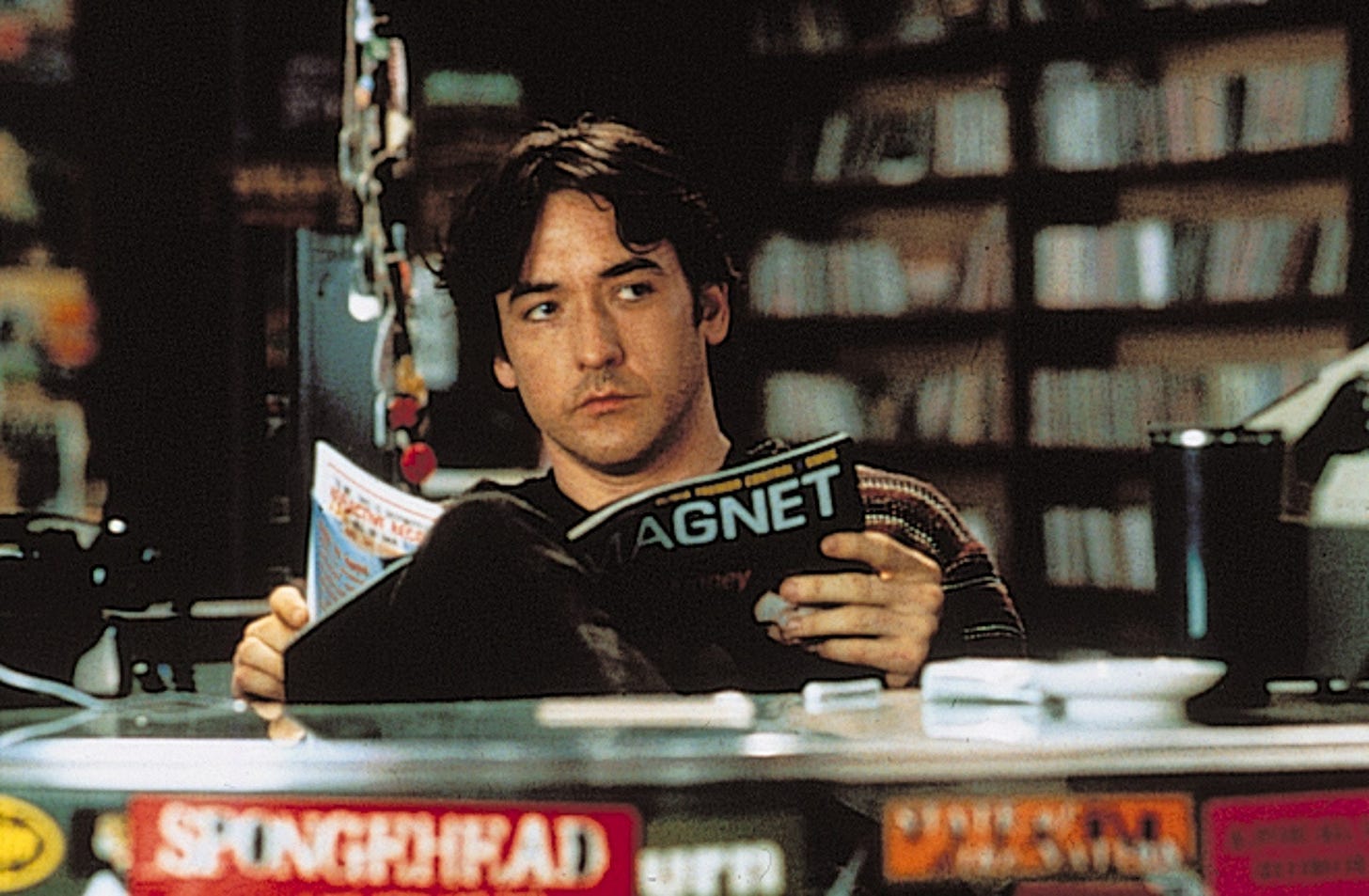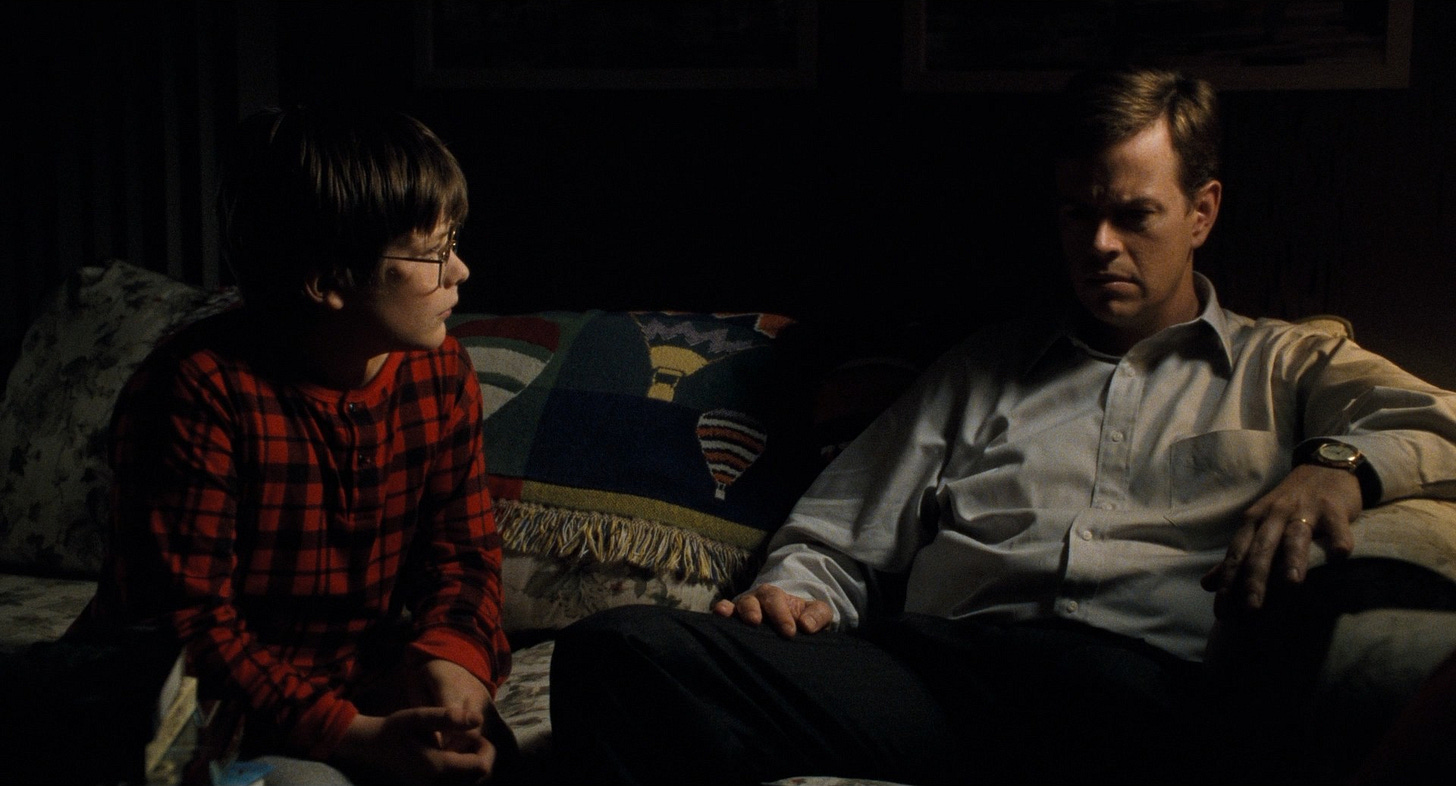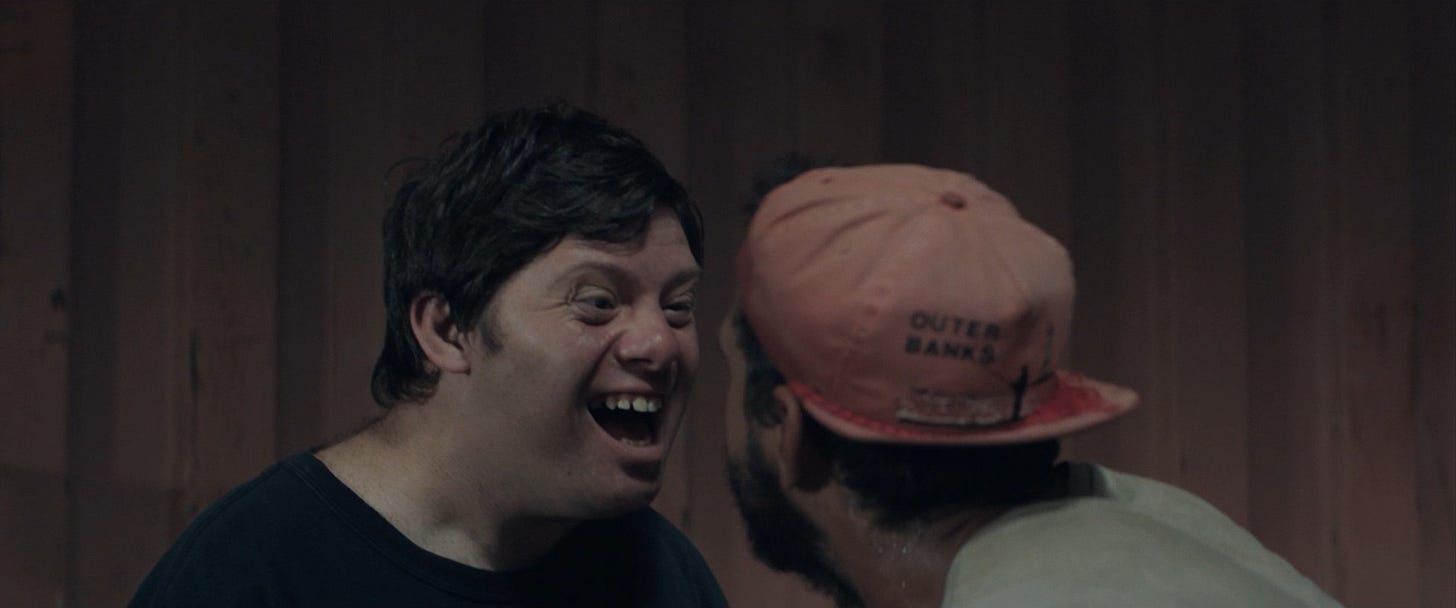Feeling All The Feels...FilmStack Challenge of the Month #6
crying, laughing, and everything in between
FilmStack Challenges. What are they?
They were started by
as a way to share ideas and have extended conversations about different topics in the FilmStack community. Each month the baton is passed to a different FilmStacker to pick what the monthly topic/prompt is.If you want to access what’s come before, I’ve created a FilmStack Challenges of the Month Database with all the responses that I am aware of. I’ve missed yours please send me a link so I can add it. I’ve also created this post with all of them linked in the Resources section of my site, and I’ll add it there as well.
I tossed around many ideas for this prompt, there was a funny one, a culturally topical one, even a business-focused one. But in the end, I chose the one that felt closest to my heart: a prompt that encourages all of us to lean in and feel all the feels.
Sometimes I feel like Rob in High Fidelity (just change music/songs to movies):
“What came first, the music or the misery? People worry about kids playing with guns, or watching violent videos, that some sort of culture of violence will take them over. Nobody worries about kids listening to thousands, literally thousands of songs about heartbreak, rejection, pain, misery and loss. Did I listen to pop music because I was miserable? Or was I miserable because I listened to pop music?" - Rob Gordon
Cinema has long been celebrated not only as a form of entertainment but as an art form that has the unique ability to evoke deep emotional responses. It engages our senses on multiple levels: through image, sound, rhythm, and pacing. The greatest films don’t just tell stories, they leave an imprint that is felt as much as it is understood. Films communicate to us in a language that goes beyond words, one that lets us experience the full spectrum of human emotions; from rage to grief, from wonder to quiet joy.
As Hugo Münsterberg, one of the earliest film theorists, observed:
“To picture emotions must be the central aim of the photoplay.”
Essentially, cinema is all about emotion. I don’t go to the movies simply to see beautiful images, I go to feel.
Because of its ability to make us feel, cinema is often called the ultimate empathy machine. It lets us step into and experience lives and emotions far beyond our own, and in doing that it creates feelings within ourselves that we might not expect. That’s what I’d love to dive into with all of you in this challenge, exploring the ways film makes us feel, connect, and see the world a little differently.
FilmStack Challenge of the Month #6:
Tell us about one, a few, or the many films that struck a deep emotional chord in you. How and why did they move you?
Perhaps you bawled your eyes out (honestly, that’s my favorite kind). I love when a film makes me cry, it’s such an unfiltered response to something powerful. If a movie gets me teary-eyed, it usually lives in my heart and memory forever.
But maybe you’re not much of a crier, or don’t want to admit you are. That’s fine too. Share a film that stirred another emotion: joy, anger, jealousy, awe… anything that made you feel in a way that stuck with you long after.
And if talking about emotions isn’t really your thing, you could try this: since cinema is also one of the most effective empathy machines, was there a film that pushed you to take action? Maybe it inspired you to stand up for an issue, or to face something in your own life you had been avoiding.
There’s no right way to respond. That’s the beauty of these challenges, everyone has their own relationship to cinema and with that brings their own perspective to the prompt. So go deep, get personal, and make us feel how films have moved you.
Cinema has made me cry (both from joy and heartbreak), laugh out loud, ache with longing, curse in frustration, and scream in fright. That’s the beauty of cinema, that’s what makes me come back to it again and again, and that’s what makes me want to spend my life creating it. There are so many films I could choose from, but for the sake of brevity, I’ll just share three of the films that have made me really feel something deeply.
MY GIRL, Howard Zieff, 1991
One of the most emotional film experiences I can remember was watching My Girl. I was 11 at the time, the same age as the protagonist, so everything she went through felt especially close to me. When her best friend Thomas J. dies, I was devastated right alongside her.
The scene that crushed me most was during the funeral. Vada walks in, sees Thomas J. in his coffin, and notices he isn’t wearing his glasses. Through sobs she cries out, “He can’t see without his glasses! Put his glasses on! He was gonna be an acrobat!” Her grief is raw and overwhelming as her father tries to hold her back.
Most people would at least tear up here—if not break down in full-on ugly cry.
But for me, what got me the most was what happened across the room. My father, lying on the couch opposite me, suddenly began bawling. I had rarely seen him cry in real life, and never during a film. To give some context, my uncle had recently committed suicide. While I knew my dad had grieved, he had done so privately, behind the closed door of his bedroom. But in that moment, watching Vada fall apart, I looked over and saw my father releasing everything he had been holding in. The bottled-up pain he had tried so hard to shield us kids from came pouring out, all because Thomas J. needed his glasses.
That was the moment, with my whole family tears streaming down our faces in the living room, that I realized just how powerful film could be. If a story on screen could break through my father’s walls and unlock that kind of grief, then cinema wasn’t just entertainment. It was a force capable of reaching places nothing else could.
HAPPINESS, Todd Solondz, 1998
On the opposite end of the emotional spectrum, but just as powerful in showing how films can stir our emotions, this time in places we’d never think it could, is Todd Solondz’s Happiness (1998). Watching it, I remember feeling deeply unsettled by myself: laughing at things that horrified me, and even, at moments, feeling for someone I knew I shouldn’t. That contradiction alone was disturbing. The mix of discomfort, dark humor, and unease stuck with me, leaving me feeling almost guilty after watching it.
The film threads together the lives of seemingly ordinary people, only to reveal the raw, taboo, and often grotesque desires simmering beneath their surfaces. Watching it felt like staring into a part of humanity we usually turn away from. What made it both unbearable and brilliant was that it refused to reduce its characters to monsters. Instead, it made me see their humanity and in doing so, made me feel uncomfortably complicit.
The moment that really got to me was the father’s confession to his son. Until then, we knew the truth, but to his child he appeared a loving parent; attentive, caring, even tender. Then the confession comes. The deliberately slow pacing, the suffocating close-ups, the son’s relentless questions, all of it makes your stomach turn. And yet, in that warped and agonizing exchange, the father answers with brutal honesty. It’s excruciating to witness, but his truth-telling becomes the only shred of humanity left in him, as though the act of honesty itself is the last protection he can offer his son against the pain and trauma he has caused. It makes you kind of, dare I say, feel sorry for him, though completely against your own will.
That’s the real weight of the film and what made me realize how impactful films can be. Cinema can take someone we’d write off as a monster, someone we’d rather keep at arm’s length, and force us to sit with their humanity. It makes us laugh when we shouldn’t, cry when we don’t want to, and question why we’re feeling anything at all. Happiness deeply affected me because it didn’t let me escape, it made me face emotions I didn’t want to claim as mine.
The Peanut Butter Falcon, Tyler Nilson & Micheal Schwartz, 2019
Many times our emotional reactions to films are shaped not only by the film but by what is going on around us, whether in that specific viewing (like in my My Girl example above) or in society in general. That’s what happened with the film, The Peanut Butter Falcon.
I stumbled across this film while visiting my parents. It happened to be playing on one of their cable channels, and since nothing else was grabbing me, I let it run. I’d heard some good things about it, but always assumed it would be a little too “feel-good” and formulaic for my taste.
What surprised me was how deeply it worked. The film doesn’t break new cinematic ground, nor does it try to, but instead leans on timeless, well-crafted storytelling. Casting Zack Gottsagen, an actor who genuinely has Down syndrome, alongside Shia LaBeouf (in what I think is one of his best performances) was perfect. Their chemistry was undeniable, and together they cracked my heart open in a way I was not expecting.
I hadn’t realized how much I needed exactly that kind of film at that exact moment and just how much joy it would bring me.
It was such a refreshing change of pace from the heaviness that dominates so many films today. In a time when the country feels so dark and divided, it felt like a small reprieve from all the negativity. To watch something that intentionally sparked compassion, that reminded us of the humanity we all share, was not just uplifting, it was necessary. Crying happy tears when the film ended left me feeling hopeful, in a time when it had been awhile since I felt that way.
That’s the kind of emotional power film has. It doesn’t just tell stories. It gets under your skin, it messes with your understanding of right and wrong, of morality, and it can even make you feel things you wish you didn’t. And once you’ve felt it, you can’t unfeel it. Whether joy or pain, cinema asks us to open ourselves to its force and be changed by it.
I hope you enjoyed a few of my emotional cinematic moments, I look forward to reading yours.
Please, put links to your posts in the comments here after you’ve written them, this way we don’t miss them!







100% all about the feels. I start my producing classes with a quote and this one from Maya Angelou is always included
"I've learned that people will forget what you said, people will forget what you did, but people will never forget how you made them feel.”
My Girl. That movie ripped my tender little heart to pieces.